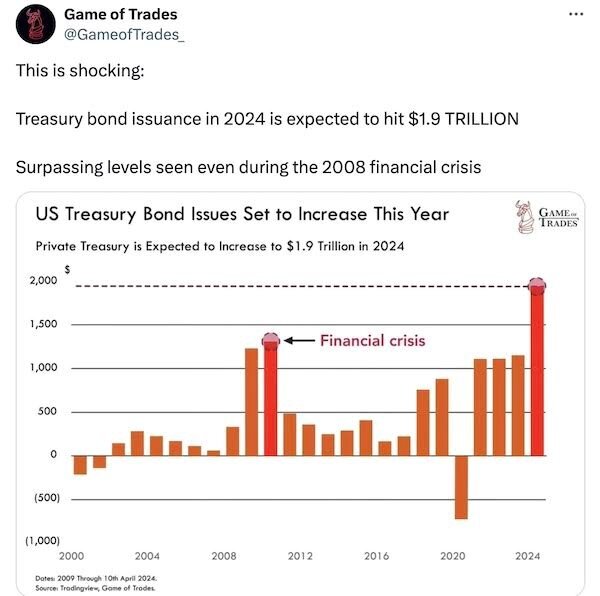|
Commentary |
|
Stock bulls seem to remain in control as optimism about Q1 2024 earnings continues to outweigh sliding hopes for Federal Reserve interest rate cuts.
Amazon is one of today’s top earnings highlights with investors anxious to see how its "AI investments" are paying off. Expectations are high that this will be reflected in strong cloud business growth after both Microsoft and Google-parent Alphabet reported impressive results late last week.
There is also a rising expectation on Wall Street that Amazon might soon announce its first ever dividend. Following dividend announcements by both Alphabet and Facebook-parent Meta earlier this month, Amazon is the last of the megacap tech companies to not pay one.
Earnings from Advanced Micro Devices (AMD) are also likely to draw a lot of attention today. Investors are anxious to see the chipmaker’s revenue for its data center segment and the outlook for AI chip demand. Both AMD and Amazon report after the market close.
Other earnings of note today include 3M, ADM, Clorox, Coca-Cola, Corning, Eli Lilly, Gartner, McDonald’s, Mondelez, PACCAR, PayPal, Prudential Financial, Starbucks, Stellantis, Stryker, Super Micro Computer, and Trane Technologies.
Today also marks the start of the Federal Reserve’s two day policy meeting. While no change is expected in the Fed’s benchmark interest rate, investors are anxious as to what Fed Chair Jerome Powell might say during his press conference tomorrow following the release of the Fed policy statement.
Bulls are hoping for a more neutral stance that reconfirms the Fed’s latest projection for three 25 basis point rate cuts this year. Bears doubt Powell will be that optimistic and expect the Fed Chief to reiterate that inflation is not slowing as fast as expected and even raise the possibility that rate cuts might not happen this year or worse, may need to be raised.
The high level of uncertainty means investors could start getting a little more jumpy a moving closer to the sidelines heading into Wednesday.
Key economic data today includes the Employment Cost Index for Q1 2024, which is expected to show employment costs rising at a +4.2% annual rate, unchanged from the previous quarter. The Case-Shiller Home Price Index, FHFA Home Price Index, and Consumer Confidence are also out today.
"Private Equity" Activity Surging: U.S. private equity activity is up +54% year-over-year, with nearly $132 billion of deal value, according to LSEG. Conventional wisdom entering 2024 was that private equity deal making would surge on a series of interest rate cuts by the U.S. Federal Reserve. The prediction was right, but for the wrong reasons. U.S. private equity activity has accelerated and there are several reasons why the market is defying the macro. The simplest is that private equity is still sitting on record amounts of dry powder, and the industry has never shown an appetite for curbing fund sizes. And those inflows are expected to continue, with State Street this morning releasing survey data showing that the rotation from public to private assets within portfolio allocations will grow further in the coming years. Additionally, the confluence of high equity values and interest rates have inspired many companies to sell. This includes companies owned by private equity, as so much dealflow now is sponsor-to-sponsor hot potato. Source Axios
WANTED... Thousands of NEW Veterinarians: Industry reports are indicating the US will need +55,000 additional veterinarians by 2030 to meet the increasing need for companion animals' health care. This comes as spending on pets' health care is expected to increase 3% to 4% past the rate of inflation over the next decade or so. There are a few factors driving the shortage, i.e. more people own pets than ever before, fueled in part by the forced isolation of the pandemic and in part by the rise of remote and hybrid work. But the number of veterinarians is holding steady ‒ meaning companion care vets are seeing more animals and are busier than ever. Source USA Today
Driverless Tractor-Trailers Becoming Reality on US Roads: On a three-lane test track along the Monongahela River, an 18-wheel tractor-trailer rounded a curve. No one was on board. A quarter-mile ahead, the truck’s sensors spotted a trash can blocking one lane and a tire in another. In less than a second, it signaled, moved into the unobstructed lane and rumbled past the obstacles. The self-driving semi, outfitted with 25 laser, radar and camera sensors, is owned by Pittsburgh-based Aurora Innovation. In less than nine months, a seven-year science experiment by Aurora will end, and driverless trucks will start hauling freight on Interstate 45 between the Dallas and Houston areas with 20 driverless trucks carrying loads between terminals for FedEx, Uber Freight, Werner and other partners. Within three or four years, Aurora and its competitors expect to put thousands such self-driving trucks on America’s public freeways. The goal is for the trucks, which can run nearly around the clock without any breaks, to speed the flow of goods, accelerating delivery times and perhaps lowering costs. They’ll travel short distances on secondary roads, too Source Associated Press
|
 |
|
Treasury Raises Borrowing Plans as US Tax Receipts Fall Short: The U.S. Treasury expects to borrow more money from private investors than it had forecast this quarter, saying tax receipts are coming in lower than it had anticipated. The department said it expects to borrow $243 billion during the April to June quarter, $41 billion higher than the estimate announced at the start of this year. Treasury said it expects to borrow more because it had to internally revise down the amount of taxes it expects to receive relative to its own forecast, though it does not disclose those forecasts. The department also issued an initial forecast of its borrowings in the July-September quarter, saying it expects to need to tap the market for $847 billion. Traders have been closely monitoring the department’s plans after it issued more debt than had been expected last year. When more debt is needed, particularly at individual maturities, investors typically want higher yields to compensate for the additional supply. The current forecast for borrowings is well above what Wall Street had expected. More detailed plans will be disclosed on Wednesday. The Treasury will tell investors how much three-, 10-, and 30-year debt is being issued, along with totals for other, less important maturities. Wall Street generally considers those plans far more significant than Monday’s announcement. If the Treasury decides to sell more 10-, or 30-year bonds than anticipated, that would represent a setback in its effort to be “regular and predictable” in issuing debt and would push yields higher. Source Barrons |
 |
|
Crackdown Coming on Wall Street's Home Buying Spree: At the 2022 peak, "investors" bought more than one in every four single-family homes sold. In fact, two of the largest home-buying firms, Invitation Homes and AMH, are publicly traded companies, while a number of other firms, backed by private equity, hold portfolios of tens of thousands of homes nationwide. Companies that buy single-family homes say their businesses provide renters the opportunity to live in desirable neighborhoods where they otherwise couldn’t afford to buy. On the flip side, lawmakers say that investors that have scooped up hundreds of thousands of houses to rent out are contributing to the dearth of homes for sale and driving up overall home prices, and in some cases making it much more difficult for first-time buyers to compete, especially with Wall Street-backed investment firms and their all-cash offers. Democrats in the U.S. Senate and House have sponsored legislation that would force large owners of single-family homes to sell houses to family buyers. A Republican bill in the Ohio state legislature aims to drive out institutional owners through heavy taxation. While homeowner associations for years have sought to stop investors from buying and renting out houses in their neighborhoods, the legislative proposals represent a new effort by elected officials to regulate Wall Street’s appetite for single-family homes. Source WSJ
How an Arizona Farming Town Lost Its Water to a Suburb: One of the biggest battles over Colorado River water is being staged in one of the West’s smallest rural enclaves. Tucked into the bends of the lower Colorado River, Cibola, Arizona, is a community of about 200 people. Nearly a decade ago, Greenstone Resource Partners, a private company backed by global investors, bought almost 500 acres of agricultural land in Cibola. In a first-of-its-kind deal, the company recently sold the water rights tied to the land to the town of Queen Creek, a suburb of Phoenix, for a $14 million gross profit. More than 2,000 acre-feet of water from the Colorado River that was once used to irrigate farmland is now flowing, through a canal system, to the taps of homes more than 200 miles away. Experts expect that such transfers will become more common as thirsty towns across the West seek increasingly scarce water. Amid a deepening drought and declines in the river’s reservoirs, Greenstone and firms like it have been discreetly acquiring thousands of acres of farmland. The purchases have alarmed local residents, who worry that water speculators scavenging agricultural land for valuable water rights will leave rural communities like Cibola in the dust. Source Wired
Aldi is Big Inflation Winner: Aldi leans more heavily than other supermarket chains on no-frills practices across its roughly 2,400 U.S. locations. The company’s stores typically carry about 2,000 separate items, compared with an average of more than 31,000 at major supermarket operators, according to FMI, a food-industry trade group. Aldi’s stores are smaller, too: typically about 20,000 square feet, less than half the size of the average supermarket. Nearly every aspect of Aldi’s operation revolves around saving money. The small-store format means cheaper rent, lower energy costs and fewer employees. A narrower selection means Aldi can purchase products from suppliers in larger volumes, at a cheaper price. Shoppers’ fatigue with soaring food prices at grocery-store chains is steering more customers toward Aldi. The company has been adding about 100 stores a year over the past decade and plans to roughly double that pace, adding 800 stores nationwide by the end of 2028 as part of a $9 billion expansion plan. Foot traffic at Aldi stores in March was up about +26% compared with the prior year and higher than the +6% increase at rival Kroger stores and the +15% uptick at Trader Joe’s. On a basket of 50 typical household items, Aldi’s prices were about -6% cheaper than Walmart’s through the first three months of the year, according to retailing research and consulting firm Customer Growth Partners. Fresh and frozen items were nearly -16% cheaper Source WSJ
|
 |
|
Futures trading is speculative and involves the potential loss of investment. Past results are not necessarily indicative of future results. Futures trading is not suitable for all investors.
Nell Sloane, Capital Trading Group, LLLP is not affiliated with nor do they endorse, sponsor, or recommend any product or service advertised herein, unless otherwise specifically noted.
The information contained herein was taken from financial information sources deemed to be reliable and accurate at the time it was published, but changes in the marketplace may cause this information to become out dated and obsolete.
It should be noted that Capital Trading Group, LLLP nor Nell Sloane has verified the completeness of the information contained herein. Statements of opinion and recommendations, will be introduced as such, and generally reflect the judgment and opinions of Nell Sloane, these opinions may change at any time without written notice, and Capital Trading Group, LLLP assumes no duty or responsibility to update you regarding any changes. Market opinions contained herein are intended as general observations and are not intended as specific investment advice.
Any references to products offered by Capital Trading Group, LLLP are not a solicitation for any investment. Readers are urged to contact your account representative for more information about the unique risks associated with futures trading and we encourage you to review all disclosures before making any decision to invest. This electronic newsletter does not constitute an offer of sales of any securities. Nell Sloane, Capital Trading Group, LLP and their officers, directors, and/or employees may or may not have investments in markets or programs mentioned herein.
|
